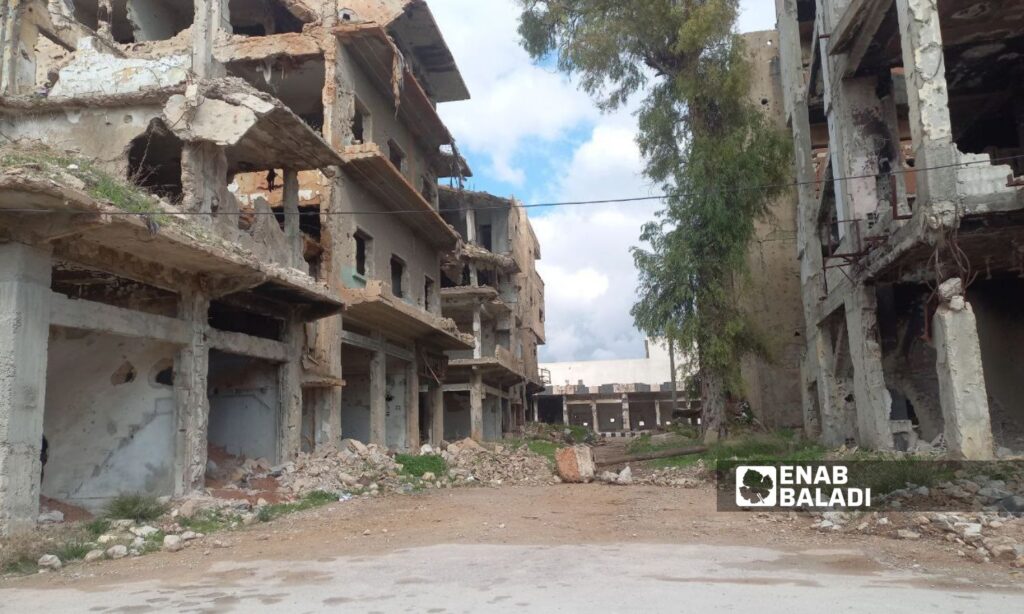Daraa – Sarah al-Ahmad
The markets and commercial shops in Daraa governorate have suffered significant damage over the years since 2011, which has harmed the trade sector. One of the main causes of damage was the bombing the city of Daraa and other towns in the governorate were subjected to for about seven years by regime forces during their attempt to regain control of the area.
In Daraa city, following the expansion of opposition forces’ control from Daraa al-Balad and the district of al-Sadd Road towards Daraa al-Mahatta, the markets that served as a point of attraction for residents of the surrounding villages became clash points with the opposition factions at the time. Among the most important are Daraa city market, and the markets of “Firas,” “al-Hamidiyah,” “Amash,” “al-Harir,” “al-Koufa,” “al-Khudar,” and “al-Hamed” market which alone contains 186 commercial shops.
After the area transferred from the control of the armed opposition to the regime in 2018, these markets and commercial shops witnessed theft and robbery operations, in addition to occasional infighting between the factions of the governorate, damaging the residents’ properties.
Thousands of shops unfit for use
An employee in the commercial registry at the Chamber of Commerce in Daraa city told Enab Baladi that the markets have been completely closed since 2013, i.e., since the clashes that occurred for the first time began, and remained closed until early 2019, when a limited number of traders returned to open their shops, especially those located in the “Martyrs” market, one of the markets that did not witness armed clashes.
Surrounding the “Martyrs” market are other markets, which were sites of armed clashes and military confrontations between regime forces and opposition factions in those years.
The employee, who withheld his name for security reasons, added that damages wreaked havoc on 3,000 commercial shops in Daraa city until early 2019, and they were closed due to those damages, but to date, only 270 of them have been rehabilitated.
The damage to the markets prompted a few traders to open commercial shops within residential neighborhoods, especially in the neighborhoods of al-Sabeel, al-Kashef, and the Northern Line district in Daraa al-Balad.
The Chamber of Commerce employee added that the municipality could not lend a helping hand to any trader or shop owner from Daraa al-Balad, especially since a large portion of it needs to be demolished and reconstructed due to the severe destruction it underwent.
On the other hand, some of the commercial shops are located in the buffer zone between the security control of the regime and the control of the opposition factions, under the “settlement” agreement that took place in 2018. This area lacks checkpoints, and no one dares to reopen a commercial shop in an unprotected area.
Security, devastation, and migration
Fadi Qanbar, originally from the town of Saida in the eastern part of Daraa governorate, told Enab Baladi that his family owned six commercial shops within the “al-Hamidiyah” market in Daraa city, specializing in selling women’s wear and children’s clothing. However, work began to decline since the outbreak of the revolution until 2013, when clashes reached the market where he worked.
Qanbar added that hundreds of commercial shops in the same market were looted after their owners left, forcing his family to transfer their goods from the commercial shop to warehouses in the town of Saida and close the shops in 2013, which remain closed to this day.
Over time, Qanbar discovered that regime forces had removed windows and doors of the commercial shops, their elements stole the tiles and broke the shop glass.
Qanbar and his family reside abroad, and he believes it is impossible for them to return to reopen their shops.
Hassan, also from Daraa city and a former furnishings shop owner, told Enab Baladi that he prepared building fittings to repair the shop, only to have these fittings stolen the next day.
Hassan’s commercial shop is located on al-Quwatli Street, next to a military checkpoint for regime forces, away from the buffer zone between the regime and the opposition, as he told Enab Baladi.
He added that many shops whose owners try to rent them to others or return to work in them are subjected to theft, which makes their opening fraught with obstacles and risks.
Hassan mentioned that two days ago, goods were stolen from four commercial shops in the Northern Line district, despite the security patrols’ presence in the neighborhood. The shop owners pointed fingers at the regime’s security, widespread in the area.
Hassan added that he had not yet repaired his shop in Daraa because he could not risk starting the repairs and exposing his properties to theft again.
Restoration of normalcy, just on paper
The state-owned newspaper Al-Thawra, in September 2023, published a report discussing the governorate plan to revive the local market in Daraa.
Daraa governor, Loay Kharita, met with the head of Daraa City Council, Amin al-Omari, and the technical committee designed for the “City Market” project, to discuss ways to launch the project that comprises 250 commercial shops with their service facilities.
During the same meeting, they reviewed the engineering designs prepared by the specialized architectural committee tasked with executing the construction of the city market, intended to replace the old commercial markets, with an area of 4,000 square meters.
The head of the city council told Al-Thawra that the market construction project consists of two floors; the first contains 134 shops, and the second contains 121 shops along with service facilities, including corridors, a prayer hall, and open areas.











